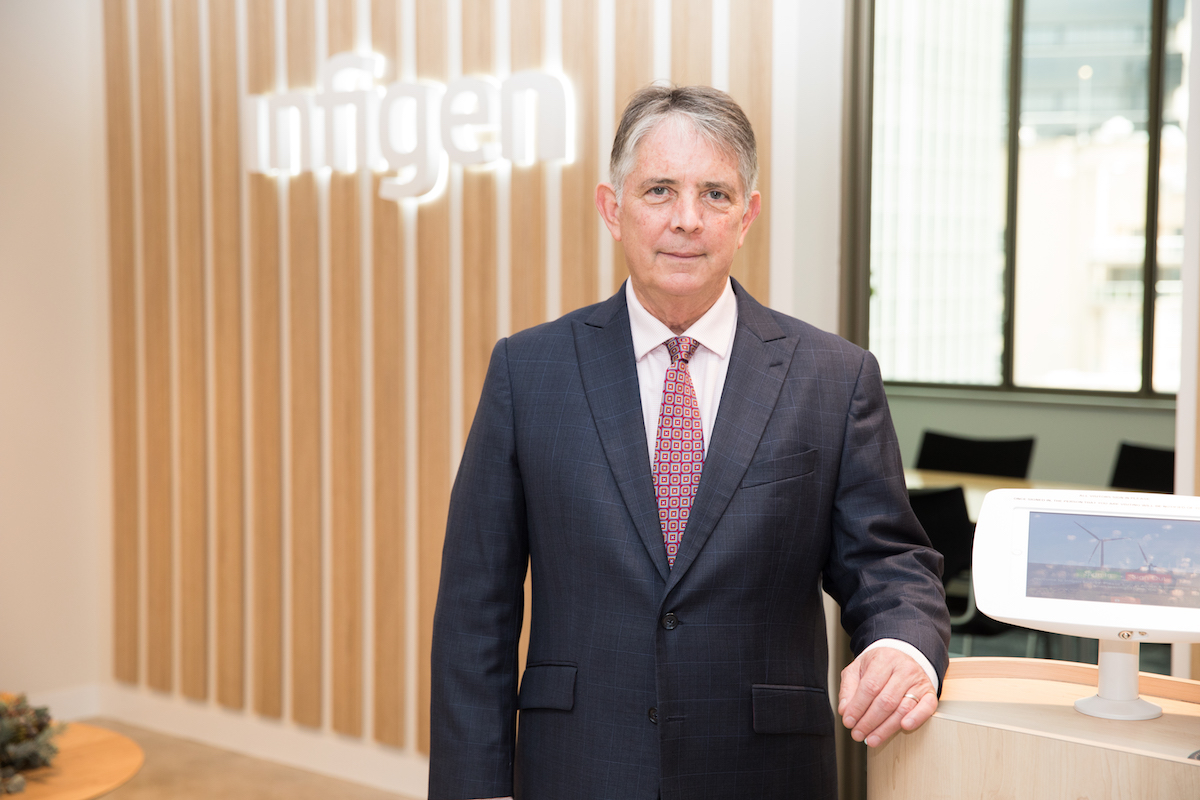Renewables make up around 16% of Australia’s energy supply and it’s a trend that is set to grow. “The broad population now believes that renewable energy is the energy source of the future,” says Infigen Energy CEO and Managing Director Ross Rolfe. “This has been influenced by the declining cost of renewable energy generation, both in wind and in solar, and more recently, the entry of battery technology into the market.”
New South Wales-based Infigen Energy builds and operates renewable energy sources, primarily wind and solar farms, throughout Australia. “Historically, people probably saw gas as the transitional fuel away from coal-fired power generation,” Ross continues, “But more recently, the price of renewables compared with the cost of gas – which has risen steeply – has meant that there is a widespread view that renewable energy makes sense going forward.”
Prior to his role at Infigen, Ross served as CEO of electricity provider Alinta Energy and CEO of Stanwell Corporation. He also held several positions in the Queensland Government including Director General of the Department of State Development and Department of Environment and Heritage, as well as Coordinator General. From 2011, Ross served as a Non-Executive Director at Infigen before securing the top job in 2016.
Repositioning the business
The first thing Ross did as CEO was reposition the business to capitalise on the expanding renewables market. “Historically, the company has been largely focused on the production of renewable energy certificates (RECs), with the energy component being secondary,” he explains. “As the percentage of renewable energy grew and became a more significant part of the energy supply industry, we had to deliver energy to meet the needs of our customers.”

RECs are given when one megawatt hour (MWh) of electricity is generated from a renewable energy source and transferredto the electricity grid. They are a type of currency for renewable energy that can be traded or sold. RECs are divided into small-scale technology certificates (STCs) and large-scale generation certificates (LGCs).
STCs are for eligible small generation units, solar water heaters and air source heat pumps, and are equivalent to one megawatt of renewable electricity. On the other hand, LGCs encompass solar farms, wind farms and hydroelectric systems, and are the same as one megawatt of renewable electricity generated over a power station’s specific baseline.
STCs and LGCs were developed as part of Australia’s Renewable Energy Target, which aims to have renewables produce 23.5% of the country’s electricity by 2020. Ross acknowledges that in order for the company to progress, it has to support the National Energy Market.
“Even though it’s referred to as ‘national’, it is still largely a series of regional markets that are connected through a transmission interconnector,” he explains. “And because the size of that interconnector is limited, it means there is a lot of price difference between states. So if you’re thinking about the sale of energy, then you need to think on a state rather than a national basis.
“What I’m trying to do is to reposition Infigen so that it’s much more focused on supplying energy to our customers. I want us to better understand the needs of larger commercial and industrial customers and deliver a customised solution to them.”
Having an adaptive culture
Going forward, Infigen doesn’t just want to grow, rather it wants to ensure it makes sound judgements when it comes to Australia’s energy policy. “Energy policy in this country remains the subject of a very vigorous and sometimes fiery public debate. That means we need to act competently with the sorts of new investments we make and where we make them,” Ross states.
“What we try to do is develop our business practices for new projects based on assumptions of what the future policy might look like and the extent to which we can influence government thinking on the shaping of any new policy.”
To do so, Ross says, the company needs to have an adaptive culture. “We are constantly in a cycle of change; therefore, we always need to be able to shift position or adapt to new circumstances as they might arise. Our company culture is very resilient.
It has had to deal with quite a lot of adversity over the period where renewable energy has been the subject of very substantial public attack. It is also a culture that tries to productively learn from failure and mistakes. When we make errors or things haven’t turned out as we hoped, we conduct a fearless, constructive post-mortem without attributing blame in any direction.
The minute you start to blame people for mistakes, you destroy the fragile confidence they have in being able to deal with any future errors.”
Ross Rolfe reveals his greatest influences and what he has learned from them
Sir Peter Cosgrove, Governor-General of Australia
“I worked with Peter when I was Head of Queensland’s Department of Premier and Cabinet, responding to the Cyclone Larry disaster. What was amazing about Peter was that while he was retired from the armed forces he still went around, in a really thoughtful way, to the communities that had been devastated by the cyclone; just quietly communicating with them, understanding their problems, acting practically to solve them and never seeking anything in return. He is a humble and compassionate person and has had a very significant influence on my views of leadership.”
Allan Griffiths, former prime minister Malcolm Fraser’s special adviser on foreign policy
“Allan taught me the importance of always understanding the other person’s perspective. Your starting point always needs to be that the other person has a legitimate and valid perspective. If you adopt a different position from that, you’re unlikely to solve a lot of problems. He was a person I thought extremely highly of.”
Len Gill, Chairman, Alinta Energy
“Len was Chairman when I was CEO of Alinta and he was always available with insightful observations and commentary on a whole range of issues. He volunteered his opinions, he didn’t try to impose them. He was an astute thinker and highly respectful of the relationship between a Chair and a CEO.”



